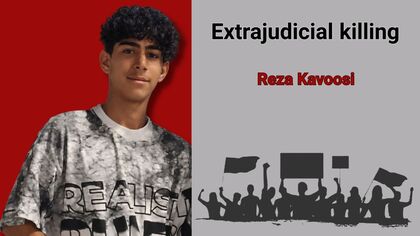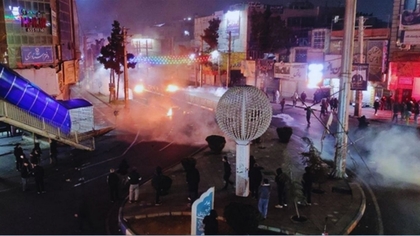Iran admits the pain of sanctions
16:10 - 21 December 2011

Western sanctions have taken such a toll on Iran over the past 18 months that now -- as the screw is about to be tightened yet further -- Tehran\'s studied insouciance is slipping, with officials admitting the economic damage being felt.
\"War-time conditions\" demanded dramatic policy reactions, the head of Tehran\'s chamber of trade and industry, Yahya AlEshaq, told Sunday\'s Iran Daily newspaper.
The country must now act \"as if under siege,\" the governor of Iran\'s central bank, Mahmoud Bahmani, agreed in comments to reporters and businessmen over the past week.
Signs of economic difficulties have been accumulating: investments are becoming rare, imports are becoming pricier, and Iran\'s currency is sliding.
The United States and Europe are about to again ratchet up the pressure with measures against Iran\'s central bank and vital oil sector.
They will add to severe sanctions imposed since 2010 by a West trying to halt Iran\'s nuclear programme, which it suspects masks ambitions for atomic weapons, despite Tehran\'s denials.
The growing evidence of the sanctions\' impact has prompted Iranian officials to drop previous assertions of business-as-usual and start acknowledging some economic pain.
\"We can\'t pretend the sanctions aren\'t having an effect,\" Foreign Minister Ali Akbar Salehi admitted on the weekend.
But \"we are not really worried,\" he told the official IRNA news agency, explaining that \"appropriate responses have been prepared for the worst case scenario.\"
A \"road map\" to circumvent new sanctions had been readied, he said.
AlEshaq also said \"the sanctions have had some impact on the domestic economy,\" notably by making imports 24% more costly.
\"The enemies have embarked on a war in the economic sector,\" he said, calling for \"war-era management\" to be imposed in return.
Iran has already been establishing trade links with other, non-Western countries, notably China. But imports have still declined 20% in the past six months according to official figures.
Exports continue to hold up, however, largely thanks to the high price for oil in the global market -- a commodity that accounts for 80% of foreign earnings for Iran, OPEC\'s second-biggest producer after Saudi Arabia.
This year, the value of Iran\'s exports topped $140 billion, with oil and derivative products accounting for $120 billion of that.
But those figures \"hide the fact that a growing part of trade is now being done under barter arrangements,\" said one European expert in Tehran who could not be named because of political sensitivities.
\"To get around the US embargo on dollar transactions, the main buyers of Iranian crude, such as China, Japan and South Korea, don\'t pay in cash any more but rather through credit lines extended to Iranian companies, which reduces the central bank\'s resources,\" the expert said.
Iran said at the beginning of this year it had around $100 billion in foreign reserves and gold.
But dwindling revenue has forced the central bank in recent months to dramatically cut foreign currency sales to businesses and individuals, an Iranian banker noted.
The central bank has also eased up on its previous strong support for Iran\'s rial, letting the currency depreciate 20% since September.
The sanctions have also taken a noticeable bite out of the oil and gas industry.
Oil production, which has dropped 10% since 2008, continues to shrink with November output this year put at 3.5 million barrels per day according to OPEC.
Lacking options, Tehran has recently announced it is suspending several non-essential projects. And even ones deemed priorities, such as the development of the giant South Pars gas field in the Gulf, are running behind schedule, according to Iranian media.
Foreign \"investment isn\'t coming any more, or very little is, because of the hostile moves\" by the West, Oil Minister Rostam Qasemi said in November.
He calculated his country needed $50 billion per year to develop Iran\'s production.
As a result, Iran has increasingly turned to its domestic market for capital, with varied success.
It has also been calling for local investors. In early December, for the first time, it handed development of an offshore oil field to a private Iranian bank.
Source - AFP
\"War-time conditions\" demanded dramatic policy reactions, the head of Tehran\'s chamber of trade and industry, Yahya AlEshaq, told Sunday\'s Iran Daily newspaper.
The country must now act \"as if under siege,\" the governor of Iran\'s central bank, Mahmoud Bahmani, agreed in comments to reporters and businessmen over the past week.
Signs of economic difficulties have been accumulating: investments are becoming rare, imports are becoming pricier, and Iran\'s currency is sliding.
The United States and Europe are about to again ratchet up the pressure with measures against Iran\'s central bank and vital oil sector.
They will add to severe sanctions imposed since 2010 by a West trying to halt Iran\'s nuclear programme, which it suspects masks ambitions for atomic weapons, despite Tehran\'s denials.
The growing evidence of the sanctions\' impact has prompted Iranian officials to drop previous assertions of business-as-usual and start acknowledging some economic pain.
\"We can\'t pretend the sanctions aren\'t having an effect,\" Foreign Minister Ali Akbar Salehi admitted on the weekend.
But \"we are not really worried,\" he told the official IRNA news agency, explaining that \"appropriate responses have been prepared for the worst case scenario.\"
A \"road map\" to circumvent new sanctions had been readied, he said.
AlEshaq also said \"the sanctions have had some impact on the domestic economy,\" notably by making imports 24% more costly.
\"The enemies have embarked on a war in the economic sector,\" he said, calling for \"war-era management\" to be imposed in return.
Iran has already been establishing trade links with other, non-Western countries, notably China. But imports have still declined 20% in the past six months according to official figures.
Exports continue to hold up, however, largely thanks to the high price for oil in the global market -- a commodity that accounts for 80% of foreign earnings for Iran, OPEC\'s second-biggest producer after Saudi Arabia.
This year, the value of Iran\'s exports topped $140 billion, with oil and derivative products accounting for $120 billion of that.
But those figures \"hide the fact that a growing part of trade is now being done under barter arrangements,\" said one European expert in Tehran who could not be named because of political sensitivities.
\"To get around the US embargo on dollar transactions, the main buyers of Iranian crude, such as China, Japan and South Korea, don\'t pay in cash any more but rather through credit lines extended to Iranian companies, which reduces the central bank\'s resources,\" the expert said.
Iran said at the beginning of this year it had around $100 billion in foreign reserves and gold.
But dwindling revenue has forced the central bank in recent months to dramatically cut foreign currency sales to businesses and individuals, an Iranian banker noted.
The central bank has also eased up on its previous strong support for Iran\'s rial, letting the currency depreciate 20% since September.
The sanctions have also taken a noticeable bite out of the oil and gas industry.
Oil production, which has dropped 10% since 2008, continues to shrink with November output this year put at 3.5 million barrels per day according to OPEC.
Lacking options, Tehran has recently announced it is suspending several non-essential projects. And even ones deemed priorities, such as the development of the giant South Pars gas field in the Gulf, are running behind schedule, according to Iranian media.
Foreign \"investment isn\'t coming any more, or very little is, because of the hostile moves\" by the West, Oil Minister Rostam Qasemi said in November.
He calculated his country needed $50 billion per year to develop Iran\'s production.
As a result, Iran has increasingly turned to its domestic market for capital, with varied success.
It has also been calling for local investors. In early December, for the first time, it handed development of an offshore oil field to a private Iranian bank.
Source - AFP



